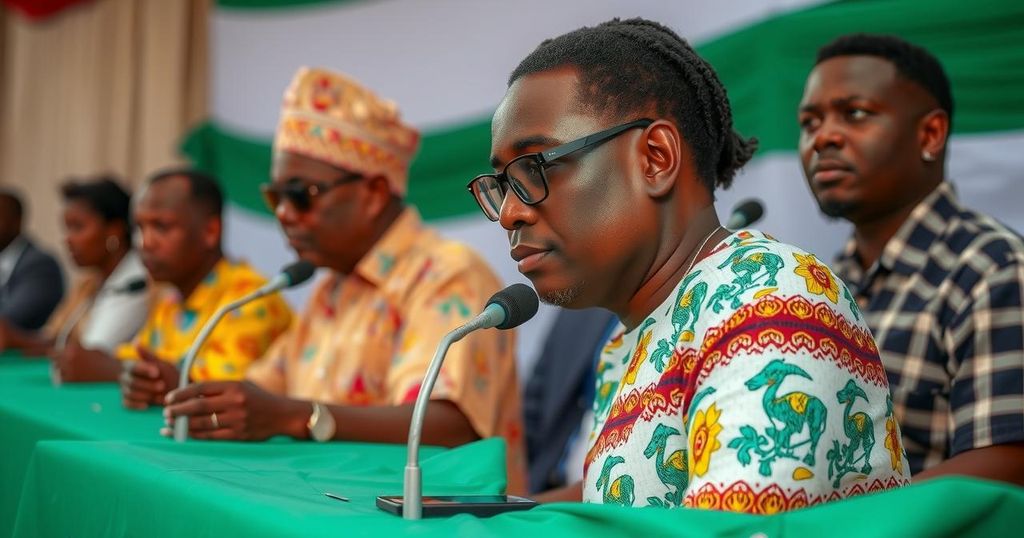World news
ACCRA, AFRICA, BEDIAKO, CHEDDAR, DEMOCRACY, ELECTORAL PROCESS, GHANA, GOVERNANCE, GOVERNMENT, JOHN TADEN, LOS ANGELES, MAHAMUDU BAWUMIA, NATIONAL DEMOCRATIC CONGRESS, NEW PATRIOTIC PARTY, NORTH AMERICA, NPP NDC, OPPOSITION, PEPPERDINE UNIVERSITY, POLITICS, UNITED STATES, UNIVERSITY OF GHANA, VOA
Sofia Rodriguez
0 Comments
Ghana’s Competitive Electoral Landscape: Mahama vs. Bawumia for Economic Reform
In Ghana, the upcoming December 7 elections feature former President John Mahama challenging the ruling party’s candidate Mahamudu Bawumia. Economic issues, including a recent debt crisis and inflation, dominate voter concerns as the country faces a competitive political landscape influenced by historical party dominance. The election outcome may hinge on voters’ responses to economic conditions and the appeal of independent candidates.
In anticipation of the upcoming national elections on December 7, Ghana is experiencing a heightened political atmosphere characterized by intense competition between the leading candidates. Former President John Mahama of the National Democratic Congress (NDC) is presenting a formidable challenge to the ruling party’s candidate, Vice President Mahamudu Bawumia of the New Patriotic Party (NPP). Mahama aims to establish a 24-hour business environment to stimulate job creation and aid the economy, which is on the mend after a significant default on its $30 billion external debt in 2022. Meanwhile, Bawumia aligns himself with efforts to reinforce the economy despite the recent challenges stemming from the COVID-19 pandemic and rising internal pressures.
Since the end of military rule in 1992, Ghana’s political landscape has primarily oscillated between the NDC and the NPP. Kwame Asah Asante, a senior lecturer at the University of Ghana, emphasizes the dominance of these parties, stating, “It’s the dominant parties; one of them is going to carry the day.” While minor parties have struggled to gain traction—averaging under 5% of electoral support—there exists a possibility that they could compel a runoff if they exceed 4%. In Accra, electoral billboards and fervent discussions among voters proliferate, with some expressing a desire for change from the two major parties.
John Kwame Bediako, an independent candidate, is generating interest among the youth with his vision for eco-friendly policies aimed at improving both economic and environmental conditions in Ghana, although experts suggest his impact on the election may be limited to influencing a runoff.
The political discourse is dominated by significant economic concerns. As Ghana ranks as the second-largest cocoa producer globally, challenges resulting from a $30 billion debt default and disruptions from the COVID-19 pandemic have ignited inflationary pressures, with rates reaching historic peaks of 54% over the last 18 months. Illegal mining practices are exacerbating rural challenges, threatening agricultural lands essential to cocoa production, and prompting voter frustration with the current administration. Asante notes that economic issues will heavily influence voter behavior, particularly in a landscape where economic hardship makes it difficult for the incumbent government to sustain support.
Voters like Wisdom Gavor and Janet Bawah express their preference for Mahama, citing his proposed initiatives to enhance job opportunities amid rising prices and economic instability, while others commend Bawumia for advancing digitization in Ghana. Ivan Duke, a proponent of the ruling party, praises the digitization policy for its role in creating accessible job opportunities and improving government efficiency. As both candidates engage in campaigning, the upcoming election is forecasted to be fiercely contested, reflecting the broader sentiments of a populace seeking change amidst socio-economic challenges.
Ghana’s political landscape has been primarily influenced by two dominant parties, the National Democratic Congress and the New Patriotic Party, since the re-establishment of democracy in 1992. Following years of extensive borrowing, the country faced a substantial external debt default in 2022, exacerbated by the economic repercussions of the global COVID-19 pandemic. Voters are increasingly focused on pressing issues such as economic conditions, job creation, and infrastructural development, all of which are pivotal in shaping their electoral decisions.
The elections on December 7 are shaping up to be a pivotal moment for Ghana as candidates grapple with a legacy of economic challenges. Voter preferences reveal a desire for both continuity and change, highlighting persistent dissatisfaction with existing political structures. As Mahama and Bawumia present their visions for the future, the outcome remains uncertain, emphasizing the critical role of economic resilience in securing citizen support.
Original Source: www.voanews.com




Post Comment